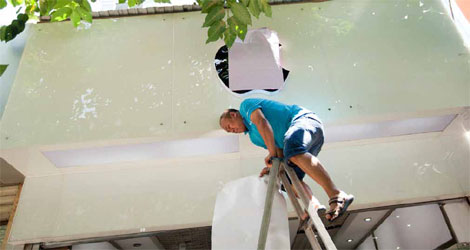Prime
Fake stores help Apple's reputation
Updated: 2011-08-11 10:33
By Tuo Yannan (China Daily)
|
The logo is covered up at a fake Apple store in Kunming, Southwest China's Yunnan province, on July 25. Apple operates four stores in China, all in Beijing and Shanghai, and has more than 900 authorized sales agents across the country. Nelson Ching / Bloomberg |
BEIJING - Apple Inc may be indebted to Chinese fake Apple stores and gray market vendors despite the recent attention they have received by media for infringing on Apple's trademark and copyright.
According to Reuters, Apple won a preliminary injunction against retailers in Queens, New York, which sell unauthorized Apple products, cases and other accessories.
The news came on July 25 amid the reports of several Chinese fake Apple stores found in Southwest China's Yunnan province and Chongqing municipality.
An American found a fake Apple store in Yunnan and posted pictures online. The fake stores in Yunnan and Chongqing were so well-designed and copied that even their employees believed they were working for Apple.
However, even when State Administration for Industry and Commerce sent requests to Apple to ask if those stores infringed Apple's legal rights, the company did not respond.
Amy Bessette, a spokeswoman for Cupertino, California-based Apple, said the company is declining to comment about the fake stores in China. She instead pointed to a page on Apple's Chinese website listing authorized resellers of the company's products.
In addition to authorized resellers, China has many unauthorized resellers, which are thriving in Beijing's Zhongguancun area. The reason why unofficial Apple stores still prosper is mainly because of the company.
Apple has labeled China as a "key market", and analysts said now might be the time for Steve Jobs, Apple chairman and CEO, to consider opening more stores and adopting new strategies in the second-largest economy in the world.
At present, there are only four authorized Apple stores in the country - two in Beijing and two in Shanghai. The United States, in contrast, is home to 236 Apple stores.
"In the past, the US and European markets were Apple's priorities," said Lu Libin, an analyst with the information technology research company Analysys International. "The Chinese market received Apple's newest products later than other countries."
Scalpers and gray market vendors were happy to fill in the gap. As a result, they greatly contributed to Apple's brand building and sales in China.
According to Apple's most recent earnings report, the company's sales revenue in China rose sixfold in the second quarter compared with the same period a year ago, hitting $3.8 billion. In the past three quarters, the company's total revenue from the country reached $8.8 billion, Tim Cook, Apple chief operating officer, said in an earnings call last month.
IPhone sales in the second quarter have gone particularly well in the Asia-Pacific region, bringing the company four times the revenue compared with a year ago. Developing economies, including China, Brazil, Mexico and those in the Middle East, contributed much to the rise in iPhone sales this quarter, according to Credit Suisse Securities (USA) LLC.
For the strong sales performance, Apple may want to thank the scalpers in China, since they were the ones waiting in line overnight for the company's latest products and distributed them throughout the country to ensure even untapped markets such as Yunnan and Chongqing have access to the popular products.
They are Apple's true sales staff members and brand image ambassadors in China. If you go to any unofficial Apple shop in Zhongguancun, they are the ones doing their best to convince you why Apple's products are better than its peers.
Their services are also better than official Apple stores. Two months ago, my iPhone4 broke. In Apple's official Sanlitun store in Beijing, they informed me that I had to schedule an appointment online, which turned out that the earliest availability was a week later. Apparently, Apple expects its valued customers, which include professionals, to go without a phone for a week. Perhaps the company believes that its valued customers should feel privileged to use their iPhones.
Upon arriving for my appointment, I still had to wait more than half an hour to see a service representative. When I took out my laptop and asked for help to backup my information, the employee told me that none of their employees know how to use the Windows operating system to backup data for Apple products and refused to assist me.
Many people are aware of the grudge between Steve Jobs, CEO of Apple, and Microsoft Corp. However, "valued" customers are innocent. Vendors in Zhongguancun will help customers transfer their data into their new iPhones and help install applications for free. If you want to learn how to use iTunes (the software platform for all Apple products), they will teach you patiently.
Apple knows the benefits unlicensed vendors in China provide, which is why the company did not take any legal action. That's opposed to recent reports of two fake Apple stores in New York, which were immediately sued by the company.
"In the long run, Apple is likely to increase its market share since it is gaining sales momentum by investing more resources into China, which it had not been doing previously," said Kitty Fok, vice-president of the research company IDC Asia-Pacific.
China Daily

Specials

Star journalist leaves legacy
Li Xing, China Daily's assistant editor-in-chief and veteran columnist, died of a cerebral hemorrhage on Aug 7 in Washington DC, US.

Beer we go
Early numbers not so robust for Beijing's first international beer festival

Lifting the veil
Beijing's Palace Museum, also known as the Forbidden City, is steeped in history, dreams and tears, which are perfectly reflected in design.
